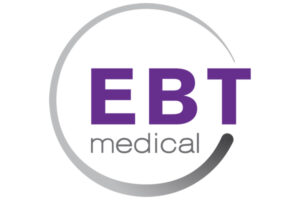Neuromodulation industry heavyweight to spearhead development of company’s suite of products for pelvic health.
Boston, Massachusetts and Toronto, Ontario – November 11, 2020 – EBT Medical, Inc. (“EBT”) a venture-backed clinical-stage startup developing disruptive neuromodulation therapies for pelvic health disorders, today announced that Mike Labbe has joined the company as Vice President of Research & Development.
“We are delighted to welcome Mike to our team,” said Keith R. Carlton, CEO of EBT. “Mike has enormous experience in all aspects of medical device development and commercialization, spanning multiple clinical indications, including a range of complex Class II and Class III neuromodulation devices from his time at BIOMEC, Nuvectra, and more recently Valtronic.”
“I’m tremendously excited to join the great team assembled at EBT, and to drive the completion of EBT’s initial product: a disruptive solution for millions of people who are searching for a non-drug, non-surgical at-home alternative treatment for OAB,” said Mike Labbe. “I’m also eager to help define the full product roadmap as EBT pursues multiple follow-on products and indications in pelvic health.”
Mike is a product development leader with over 25 years’ experience managing full life cycle medical deviceproductdevelopmentandcommercialization. Hehasexpertiseinallphasesofproductdevelopment, including clinical inputs, product definition, system architecture, detailed multi-disciplinary product development, V&V testing, regulatory submissions and manufacturing design transfer and ramp. Prior to EBT, Mike served as the Director of Engineering for Valtronic, a device design and manufacturing company specializing in complex medical electromechanical systems. Previously, he was the Director of R&D at Nuvectra, Greatbatch Medical/Integer Holding’s neuromodulation spinout company, where he was responsible for the ground-up development and commercialization of a novel 24-channel, fully implantable neurostimulation system with applications in the treatment of chronic pain, overactive bladder, and deep brain applications. Prior to Greatbatch, Mike was the VP of Engineering for BIOMEC, where he grew and managed a startup cross-functional engineering team prior to BIOMEC’s eventual acquisition by Greatbatch. Mike earned a B.S degree in Electrical Engineering from Worcester Polytechnic Institute and a M.S. in Biomedical Engineering from Case Western Reserve University.
Mike will work with Dr. Paul Yoo to oversee EBT’s basic scientific research and will drive development of EBT’s product lines starting with the company’s ground-breaking noninvasive neuromodulation therapy for overactive bladder (OAB). He will help chart EBT’s product development roadmap as the company explores various additional system iterations and indication expansion efforts in pelvic health. Lastly, given his extensive background, Mike will play pivotal role in driving EBT’s general business strategy as the company approaches launch.
About EBT Medical
EBT Medical was founded in 2014 based on scientific discoveries made at the University of Toronto with a mission to develop novel neuromodulation technologies that restore control, dignity and independence to those silently suffering from pelvic floor disorders. EBT’s first product is a clinical-grade, noninvasive neurostimulator and associated ecosystem for overactive bladder (OAB). EBT has a significant patent estate around multiple neuromodulation technologies including issued patents on the Saphenous nerve for all pelvic health indications. EBT’s management team and world-class advisory board have decades of relevant experience in pelvic health, neuromodulation, and consumer health. Learn more about EBT Medical at www.ebtmedical.com
About Overactive Bladder and Neuromodulation
Overactive bladder is a disabling syndrome affecting nearly 550M worldwide1. It is characterized by frequent, sudden, uncontrollable urges to void, often followed by incontinence episodes that are embarrassing and significantly impede activities of daily living. The major symptom of OAB, Urge Urinary Incontinence (UUI), is thought to be caused by over-signaling to & from the bladder and the pontine micturition center located in the brain stem. Over 50%2 of those with OAB remain undiagnosed and silently suffer, with marked increases in depression, anxiety, sleeplessness due to nocturia (waking to void), and social isolation. The economic impact of OAB in the United States was estimated at $76B including direct costs and indirect costs such as increased urinary tract infections, falls from running to the bathroom, and absenteeism3. Neuromodulation has been an established therapy for UUI since it was first approved in 1997.
Contact
Keith R Carlton
Chief Executive Officer
[email protected]
Disclaimer
Certain information set forth in this press release contains “forward-looking information”, including “future oriented financial information” and “financial outlook”, under applicable securities laws (collectively referred to herein as forward-looking statements). Except for statements of historical fact, information contained herein constitutes forward-looking statements. Forward-looking statements are provided to allow potential investors the opportunity to understand management’s beliefs and opinions in respect of the future so that they may use such beliefs and opinions as one factor in evaluating an investment.
These statements are not guarantees of future performance and undue reliance should not be placed on them. Such forward-looking statements necessarily involve known and unknown risks and uncertainties, which may cause actual performance and financial results in future periods to differ materially from any projections of future performance or result expressed or implied by such forward-looking statements.
Although forward-looking statements contained in this presentation are based upon what management of EBT Medical believes are reasonable assumptions, there can be no assurance that forward-looking statements will prove to be accurate, as actual results and future events could differ materially from those anticipated in such statements. EBT Medical undertakes no obligation to update forward-looking statements if circumstances or management’s estimates or opinions should change except as required by applicable securities laws. The reader is cautioned not to place undue reliance on forward-looking statements.
1 546M affected individuals in 2018. Filipetto et al.: The patient perspective on overactive bladder: a mixed-methods needs assessment. BMC Family Practice 2014 15:96.
2 Ibid.
3$76B in 2015. J Manag Care Pharm. 2014 Feb;20(2):130-40. “Economic burden of urgency urinary incontinence in the United States: a systematic review.”








